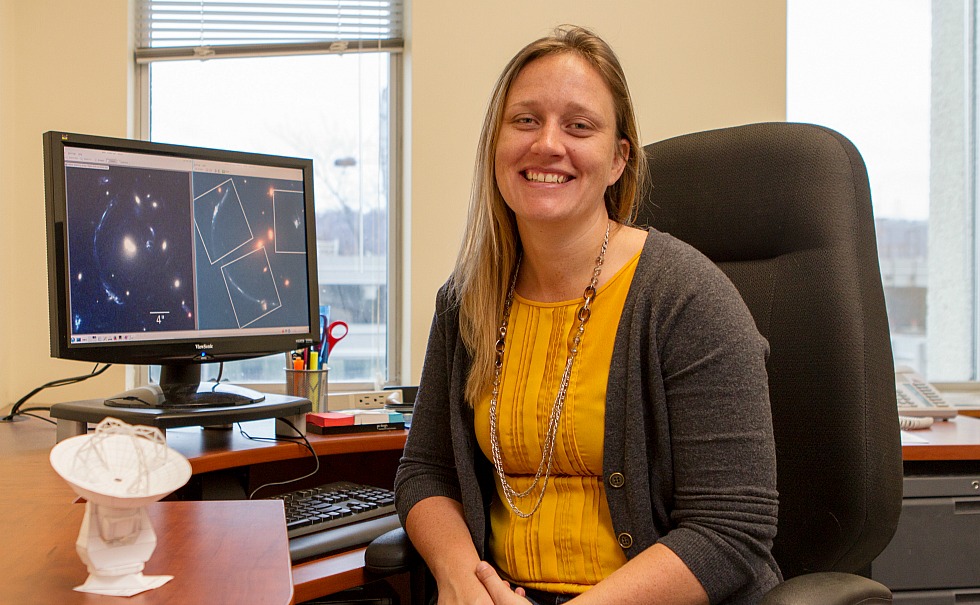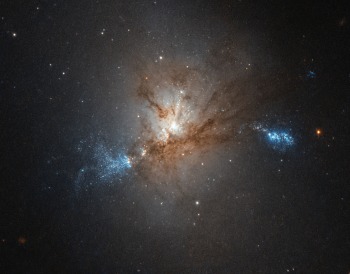Astronomy fellow looking 10 billion years into cosmic history to unlock the secrets of “dusty” galaxies

Chelsea Sharon, the inaugural William and Caroline Herschel Postdoctoral Fellow, will spend the next two years at McMaster pursing her research on galaxy evolution.
BY Erica Balch
December 12, 2016
While many people peer up at the clear, night sky to unlock the secrets of the universe, Chelsea Sharon is looking into the interstellar dust.
Sharon, the inaugural William & Caroline Herschel Postdoctoral Fellow, will spend the next two years in McMaster’s Department of Physics and Astronomy pursuing her research on galaxy evolution, looking back 10 billion years into cosmic history to learn more about why galaxies in the present day universe look the way they do.
“Why do they have the colours they have? Why do they have the masses they have? There’s a variety of ways to explore these questions, but the way I do it is by looking at dusty, star forming galaxies in the early universe to characterize the molecular gas that fuels star formation,” says Sharon who received her PhD at Rutgers University and recently completed a postdoctoral fellowship at Cornell University.
Sharon focuses on galaxies formed in the first third of the history of the universe– when star formation rates were much higher than in today’s galaxies like the Milky Way– and which are often obscured by clouds of interstellar dust and gas.
The dust in these galaxies absorbs their starlight and re-radiates it as infrared wavelengths, making these galaxies nearly invisible to optical telescopes, but incredibly bright in the infrared.

Sharon observes these galaxies using powerful radio telescopes, which are able to detect the gas the fuels dusty galaxies’ extreme star formation rates. This data helps her to measure properties of the gas, like its temperature and motion, and provides insight into the processes that drive star formation.
“I focus on the radio side of things to answer questions like, are these galaxies forming stars at a high rate because there is just much more gas and dust around, or is the process of star formation more efficient at these times? Are the physical processes driving star formation different today than in the early universe, and that’s why they have higher star formation rates? Since we don’t see such high rates today, what ends these periods of rapid star formation– do they just exhaust their gas supply or do other galaxy properties play a role?”
Sharon says the Herschel fellowship will allow her to focus on finding answers to these questions.
“This is an opportunity for me to do my own thing and start building my own independent research program,” explains Sharon who says she’s also looking forward to working with faculty members in the Physics and Astronomy Department at McMaster.
“Being in the Department is nice because although none of the astronomy faculty do exactly what I do, facets of their research are related to my own,” she says, “That makes it an interesting environment where I can expand in new directions and learn new areas.”
Applications for the fellowship came from all over the world and were read by a committee made up of McMaster research faculty in astrophysics. The committee was c0-led by Christine Wilson, professor in the Department of Physics and Astronomy and Laura Parker, an associate professor, also in the Department of Physics and Astronomy.
“Chelsea’s expertise in studying distant star-forming galaxies made her a natural choice for the inaugural William & Caroline Herschel Fellow,” says Wilson. “Her research interests strongly complement my personal research on star-forming gas in nearby galaxies, but also resonate with Dr. Laura Parker’s research on the evolution of galaxies with cosmic time, and the cosmological simulations carried out by Dr. James Wadsley and Dr. Hugh Couchman.”
The Herschel fellowship was created through the William & Caroline Herschel Fund at McMaster, the result of a gift to the University from Bill Harris, professor emeritus in the Department of Physics & Astronomy.
“I have been devoted to the McMaster astrophysics division for my whole career and I wanted to do something tangible to help it continue to be one of the strongest research units at the University,” says Harris, adding that there are comparatively few research funding programs in Canada aimed at scholars in the post-doctoral stage of their development. “The Herschel Fund will help,” he says.


